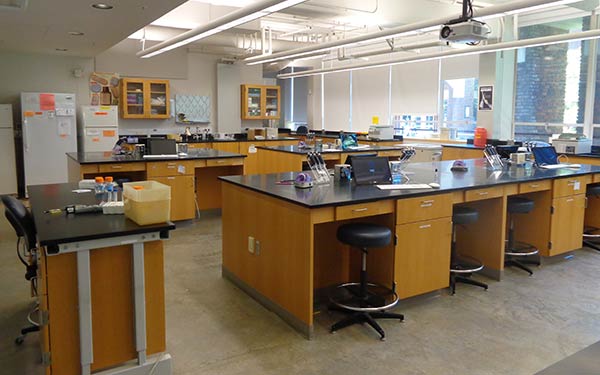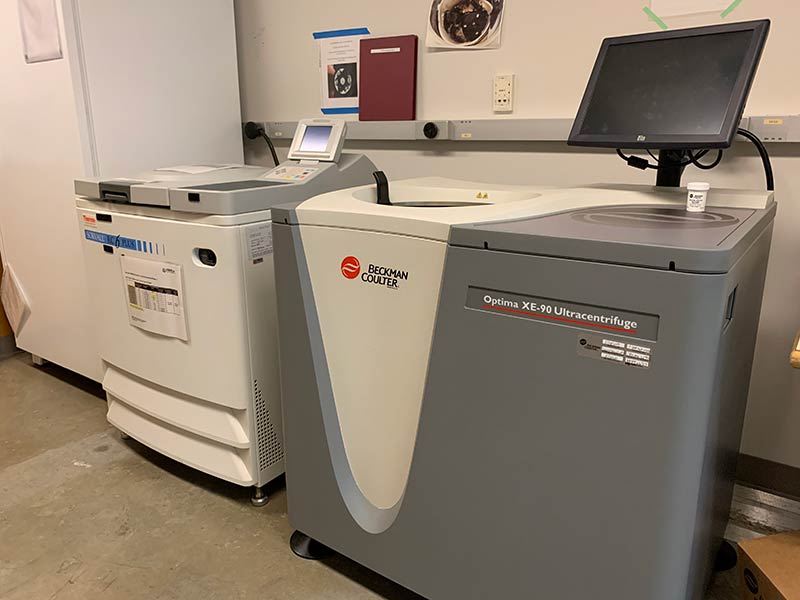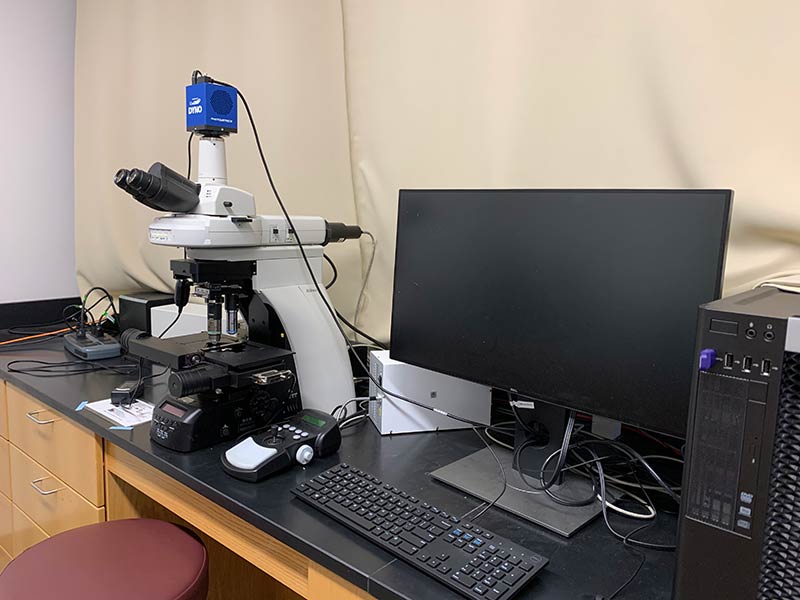Facilities
The Biology Building
The Biology Department is housed in the L.E. Griffin Memorial Biology Building, which includes the Lewis H. Kleinholz Memorial Laboratories. The Biology Building is located towards the eastern end of the central campus (campus map).
The 44,800-square-foot biology building houses efficient and modern teaching and research spaces for the biology faculty, staff, and students, and has had broad benefits for the Reed community.
Teaching Laboratories
Research Laboratories
Biology Stockroom
Animal/Plant Facilities
Brehm Biodiversity Center
Cell Culture
Common Equipment
Computing Facilities
Microscopy/Imaging
Molecular Biology
Nuclear Reactor
Campus Biology
Teaching & Research Facilities
Reed's Biology program has been built upon a conviction that boundaries between teaching and research should be minimal. Our success in training first-rate biologists comes in part from making available our excellent facilities and equipment to faculty and students alike. The design of our research facilities and the acquisition of equipment has been primarily guided by the expertise of our biology faculty. Students conducting research for coursework, independent projects, summer research internships, and the senior thesis are provided with the knowledge and skills to allow full access to all of our research tools.
The building renovation completed in 2001 has been accompanied by more than a decade of successful awards that have provided our department with modern biological equipment for teaching and research. Major financial support for new equipment has come from the Howard Hughes Medical Institute, the Kresge Science Initiative, the M.J. Murdock Charitable Trust, the National Science Foundation, as well as generous gifts from individual donors.
Teaching laboratories

Both the introductory and upper-division courses in biology include weekly laboratory sessions where research tools and techniques are introduced and used to collect biological data. Our building renovation in 2001 allowed the biology faculty to develop dedicated teaching laboratory spaces designed specifically to support the activities in the Introductory course and in each of our upper-division laboratory courses. The arrangement of student benches, instructional technology, dedicated equipment, and the support spaces are all tailored to the teaching and research needs for each laboratory course.
Research laboratories

All faculty have dedicated research spaces next to their offices, with the layout and research capabilities designed to fit their particular research needs. In addition to supporting faculty research, these well-equipped laboratories are used by thesis students, summer interns, and even students completing research projects for upper-division courses.
Biology Stockroom
The Biology Stockroom provides essential support for both teaching and research activities in the department. With a full-time staff of two and the assistance of student workers, the stockroom prepares equipment and materials for all teaching labs, assists students and faculty in their research, and manages the shared research equipment and facilities for the department.
Animal/Plant Facilities

- Multi-room greenhouse with independent temperature and lighting schedules and more than 500 square-feet of bench space
- Housing and care of both aquatic and terrestrial vertebrate and invertebrate animals
- Walk-in constant temperature rooms and freestanding growth chambers
- Automated animal behavior tracking with Ethovision software
Brehm Biodiversity Center
- Home to the Department's herbarium (REED) with more than 8,000 plant specimens
- Government documents and maps related to PNW natural history to support field research
- Capability for ecological modeling, data analysis, and Geographic Information Systems (GIS)
Cell Culture
- Laminar flow hoods, controlled-atmosphere incubators for sterile propagation of animal and plant cells
- Dedicated rooms for culturing and examining cells in a clean environment
Common Equipment

Multiple pieces of general equipment are found throughout the building to support a diversity of biological investigations, such as:
- Constant temperature rooms
- Autoclaves and shaking incubators
- Standard and –80 freezers
- Analytical balances
- High-capacity and ultracentrifuges
- Building-wide hospital-grade deionized water supply
- Equipment to allow collection of organisms and data quantifying biotic and abiotic environmental features
Computing Facilities
- Thorough integration of digital technology into all teaching and research activities
- Direct acquisition of data in digital format
- Computers at all student workstations
- Wireless network access throughout the building and campus
- Computational Biology (CompBio) lab with eight Linux computers for work on computationally-intensive research and thesis projects
Microscopy/Imaging

- High quality compound and dissecting microscopes in teaching labs, many with epifluorescence capabilities
- Scientific CMOS cameras coupled to ImageJ/Micro-Manager or Nikon Elements software, for digital image acquisition and processing
- Additional state-of-the art advanced light microscopy instrumentation includes: two laser scanning confocal microscopes, TIRF microscope, spinning disk microscope, Deltavision deconvolution system, Imaris image processing software
Molecular Biology
- Thermal cyclers for PCR, many with gradient capability
- Dual channel (2 color fluorescence detection) thermal cyclers for real-time qPCR and high precision melt analysis
- Gel electrophoresis and imaging equipment, including quantitative documentation of chemiluminescence and fluorescence
- Nucleic acid quantification via Nanodrop and Qubit
- Plate readers to measure absorbance, luminescence, fluorescence
- Four-channel flow cytometer
- Automated nucleic acid and protein purification system
- Nanopore nucleic acid sequencing system
Nuclear Reactor
The college operates a nuclear reactor that is the only facility of its kind in the US operated primarily by undergraduates (reactor operators are licensed by the Nuclear Regulatory Commission). The reactor facility can be used to quantify trace-elements in samples by Neutron Activation Analysis, and has been used by biology students during their class independent projects and thesis research.
Campus Biology
The Reed College campus has many elements that are of significant interest to biologists:
- The "Trees of Reed College" is a web site that provides access to a database maintained by the Physical Plant which describes all of the tree species planted as part of the main campus landscape. The site includes both maps for learning the identity of a tree whose location is known, a searchable index to find a particular species of tree on campus, as well as information about trees that have been planted as memorials.
- The Reed College Canyon is part of the Johnson Creek Watershed and an important biological resource for both the campus and the Portland Community. The Canyon pages include information about the history, physical setting, flora, and fauna of this beautiful area on campus.
- The Reed College Herbarium (herbarium code: REED) includes many plant specimens collected from the campus and canyon, providing a record of botanical diversity during the history of the college. The specimens have been digitally documented and can be searched through an online database.